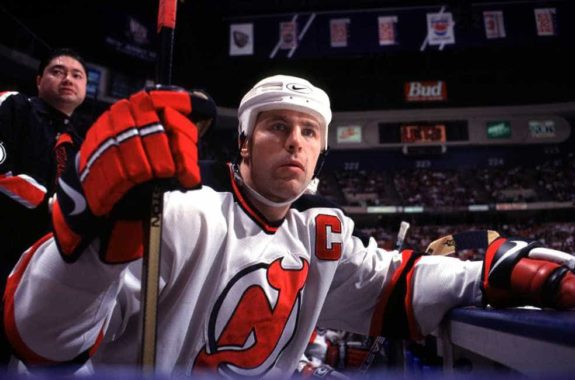Ever since his electrifying playoff debut for the Colorado Avalanche during the 2019 Playoffs, Cale Makar has been on a statistical trajectory for admission into the Hockey Hall of Fame, and barring any unforeseen obstacles, his induction is tentatively scheduled in a decade’s time. This is a preview of what’s to come, as the hockey world watches Makar take the next leap forward in his young career.
Current Hall of Fame Criteria
The main caveat that will be guiding this section is that for a defenseman’s accomplishments to be considered, his playing career had to have taken place entirely during the modern era of the NHL, which is adjudged to begin with the 1967-68 season. This was the first season in which the league significantly expanded, now featuring 12 teams.
I will be including both Bobby Orr and Serge Savard in this exercise, who each played a single season in the pre-expansion NHL (Savard only suited up for two games), as the pair helped redefine the responsibilities of defensemen in hockey. Their impact expanded how the position was conceptualized tactically, and encouraged expansive and dynamic play from NHL rearguards, rather than being stapled to their own blueline.

Including the aforementioned special cases, there are currently 24 defensemen in the Hall of Fame who fit this criteria. By noting their levels of production and overview of accolades, we can generate a checklist that will help gauge how much of a case Makar has already made for himself, and how far he still has to go.
After scouring the list, longevity, offensive production, and team and individual accolades are the key variables in determining whether a defenseman will be inducted into the Hall of Fame upon retirement. 83 percent (21 of the 24 members) played at least 1000 games over their career, and 75 percent (18 out of 24) accumulated over 750 points in the NHL. 14 out of 24 (58 percent) had won at least one Norris Trophy, and just under 80 percent (19 out of 24) had their name engraved on the Stanley Cup as a player.
It is important to note that these are not a set of rigid criteria, as players were inducted even while lacking either the preferred statistical resumé, or the desired team and individual hardware. All but one defenseman (Mark Howe, son of Gordie) met at least one out of four of the designated benchmarks, and he likely would have hit the games played and points scored criteria if he hadn’t spent six seasons in the rival professional hockey league at the time, the World Hockey Association (WHA), skating alongside his esteemed father.
In particular, there is one individual award that, if won, almost certainly guarantees that a player will be named to the Hall of Fame upon retirement. Of all the defensemen to have ever won the Norris Trophy since the award was first introduced in the 1953-54 season, only Randy Carlyle hasn’t been inducted into the Hockey Hall of Fame upon becoming eligible.
However, that is not to say that a player can’t be inducted if never named the NHL’ s best defensemen at some point during their career, as Brad Park and Scott Stevens are two notable blueliners to have not been honoured with the Norris Trophy, a pair who had the misfortune of playing in the same era as Bobby Orr and Nicklas Lidstrom, respectively.

Instead, Park relied on an impressive portfolio of individual statistical excellence and year-end All Star Team nominations, while Stevens was a crucial component of the New Jersey Devils’ Cup-winning outfits in the late-1990s, and early-2000s, who were in equal parts legendarily stingy, and catastrophic for the NHL in terms of on-ice entertainment.
Now, with having laid the groundwork of what makes a defensemen worthy of the Hall of Fame, let’s take a look at how Cale Makar has fared thus far in the NHL, and what still remains to be accomplished for his application to be made as ironclad as possible.
Analyzing Makar’s First Two NHL Seasons
As I identified in the previous section, a defenseman’s application for the Hall of Fame is comprised of several different categories, both statistical and in terms of tangible awards. I will be analyzing Makar’s career thus far in three segments: the regular season, the Stanley Cup Playoffs, and his accumulation of year-end honours and distinctions. The statistical information required to formulate this argument is partially gleaned from Sports Reference’s Stathead tool, which requires a paid subscription to use after exhausting the free trial.
Makar’s Regular Season Numbers
As Makar has only participated in two full regular season campaigns, I will be limiting my scope to the first two seasons of an NHL defensemen’s career, provided that they are under the age of 23 in both of those campaigns and have played at least 82 total games in that time span, a full NHL season’s worth of appearances.
There are 13 defensemen from the modern era who fit that initial criteria while also scoring at a minimum rate of at least 0.75 points-per-game in their first two seasons. While Makar only ranks 11th in total points scored, the fact that he has played the third least total games of that group means that his scoring pace soars up the leaderboard. His rate of 0.93 points-per-game ranks fourth among the qualified defensemen, ahead of several legends of the sport including Ray Bourque, Paul Coffey, and Chris Chelios.
If Makar’s outputs were not impressive enough on their face, the much lower rate of scoring in the modern NHL makes his early production even more noteworthy. The Stathead tool is able to standardize each skater’s scoring rates and totals, accounting for how different eras in NHL history have been historically high-scoring (think the high-flying 1980s) while others have been notoriously dull (the Dead Puck Era of the mid- to late-1990s).

A single point in the 2020-21 season is worth more than a point in the 1985-86 season for example, because a typical game in 1985 featured more goals on average than one today. If you’re still not getting the gist of it, era-adjusted stats resemble international currency conversion, where a much stronger American dollar is worth more than the Canadian dollar and offers more purchasing power when it comes to the Canadian market.
For example, the 1985-86 season, in which Wayne Gretzky set the single-season points record, was comprised of 1680 games (80 games per team multiplied by 21 teams) where an average of 7.92 goals were scored in a given matchup. In comparison, the 2020-21 season featured 868 total games (56 games each for 31 teams) and an average of 5.22 goals per game.
Thus, a game from the 1985-86 season typically featured, on average, around 1.5 times more goals per game than one from the 2020-21 campaign. As such, Makar’s totals should be multiplied by 1.5 to obtain a historically accurate scoring output. Once this quick conversion process is complete, we see that his 44 points in 44 games from last season are worth the equivalent of 66 points in 44 games in 1985-86. When this total is extrapolated across a full 80-game season, it puts him seventh in scoring, and only behind Paul Coffey among defensemen.
So, while Makar only ranks 11th in total points before having been adjusted for era-specific scoring rates, he actually ranks first for points scored among all NHL defensemen from the modern era, during their first two under-23 seasons when the rates have been taken into account. Think of any of the NHL’s all-time great blueliners – he’s ahead of them all.
While era-adjusted statistics are a useful tool for a quick comparison across decades, they are quite crude tools, and ultimately we’ll never truly know how today’s players would fare in a different time period. Yet, it is obvious that Makar is currently accomplishing something unprecedented in terms of offensive production from a defenseman.
Makar’s Playoff Performance
Although a player’s playoff statistics are not officially considered when evaluating their Hall of Fame candidacy, it pays to see exactly how they rank when it comes to competing in the most arduous portion of an NHL season. With how much NHL executives seem to be swayed by memorable performances in a small sample of games (check the contract page of any of Bryan Bickell, Ville Leino, and Dave Bolland) when it comes to evaluating players, greatness and consistency in the most high-profile games etches a player’s legacy into history, and could be the deciding factor in whether or not they gain acceptance into the Hall of Fame.

Like the previous section, I’ve limited my scope to NHL defensemen from the modern era who played at least 20 playoff games before turning 23, although Makar has made 35 postseason appearances in that time frame. This was done to filter out abnormal per game scoring rates from defensemen who may have produced at an unsustainable clip in a small sample size of games.
Out of 121 qualified defensemen, Makar ranks 13th in goals scored (7), sixth in assists (24), and seventh in total points (31). Of the defensemen in the top 10 for playoff scoring, six were inducted in the Hall of Fame, with Makar, Dallas’ Miro Heiskanen, and Los Angeles’ Drew Doughty, still being active players.
Regrettably, Stathead does not provide era-adjusted totals for playoff stats but Makar is sixth in playoff points per game among the same group of defensemen, sandwiched between Paul Coffey and Drew Doughty. It doesn’t need to be restated, but we have something special here with Makar, so don’t miss out on the bandwagon.
Makar’s Hardware and League Honours
With only two full seasons under his belt, it’s not surprising that Makar has failed to garner many accolades to this point. Although he was awarded the Calder Trophy in 2019-20 for the best performance by a rookie skater, he was bested by the New York Rangers’ Adam Fox for the Norris Trophy last season, finishing second in voting.
However, in recognition of his otherwise outstanding campaign, Makar joined Fox as the two defensemen on the NHL’s First All Star Team, foreshadowing what will likely be an annual joust for the honour of the league’s best defensemen over the next decade.
In terms of team success, Makar’s Avalanche have failed to advance past the second round of the playoffs, meaning that a Stanley Cup is still missing from his trophy cabinet. Yet, if last season’s enthralling capture Presidents’ Trophy is any indication, Colorado will be a contender for Lord Stanley’s chalice once again this year and Makar may be celebrating a championship sooner rather than later.
Applying the Hall of Fame Rubric
Let’s rewind to the first half of this article where I stated what it takes to have a legitimate claim to the Hall of Fame, and evaluate where Makar stands to date. Almost all of the defensemen from the NHL’s modern era who have been inducted have met or exceed at least two of four barometers: 1000 total NHL games, 750 total points, a Norris Trophy, and a Stanley Cup. While the explosive start to his career has given him a cushion, there is still a lot left to accomplish before his induction ceremony.
You might also like:
- Projected Lineups for Blues vs Avalanche – 12/31/25
- Elite Goaltending & Healthy Roster Propelling Avalanche’s Historic Season
- NHL Morning Recap – December 30, 2025
- Projected Lineups for Kings vs Avalanche – 12/29/25
- Avalanche Week Ahead: Schedule & Storylines – MacKinnon, Makar, Necas and More
Makar’s Statistical Resumé
The checklist of statistical criteria will take the most time to complete, with the 1000 games threshold necessitating that a player completes at least 12 82-game seasons. Makar has currently played in 101 total games, which leaves 899 remaining appearances to be made over the course of his career. With Makar about to turn 23, the nearly 11 full seasons it would require to reach 1000 would take him to 34 years old, which is relatively young and ignores the possibility of playing into his late-30s. One cause for concern is Makar’s health, as his first two seasons have been marred by injury trouble. However, he has some leeway with time on his side, and this checkpoint is the easiest to pass.
Including his totals from his first two NHL seasons, Makar remains 656 points from 750. If we conservatively estimate that he will play for at least 10 more seasons (around 820 additional games), he would have to maintain a scoring pace of at least 0.8 points per game to reach that mark within 10 years. Thus far, Makar has scored at a rate of 0.93 points per game, which far exceeds the minimum pace required to get to at least 750 points.

Remember, this is accounting for a restrained guess of 10 more seasons (which only takes him to age 33), and that we have not yet seen his peak productive years. Considering his blistering scoring rate thus far, meeting the first two benchmarks is only a matter of consistent physical health, and the simple passage of time.
Makar’s Trophy Case
The criteria which involves individual and team success is the more difficult prediction to make, as so many things have to go right for a team to win the Stanley Cup. Luckily, Makar has two factors working in his favour that make collecting trophies and awards much easier: his youth, and Colorado’s place in the NHL hierarchy, both now and for the foreseeable future.
Makar has already been a Norris Trophy finalist, and it would not be a surprise for him to win the award as soon as this season. In any case, he has about five to seven years of his productive peak to account for, and the bet that he is named the NHL best defenseman at least once in the next decade is a fairly easy one to make.
As I explored in my last article, Colorado has the youngest and most prolific core among the current Stanley Cup contenders, and is poised to dominate the NHL for years to come. The Avalanche eked out the Golden Knights for the Presidents’ Trophy and entered the playoffs with the league’s best record, although they sputtered when going head-to-head with their Western Conference rivals. Despite falling short in the second round in back-to-back postseasons, a Stanley Cup triumph beckons for the frustrated group, especially as teams which defined the 2010s, such as the Tampa Bay Lightning and Boston Bruins, gradually move out of their competitive window.
Although team success is impossible to predict, Makar is well on his way to rocketing past the two statistical thresholds that I have established, which would almost guarantee he is eventually named to the Hall of Fame, especially if he continues to be named to year-end All Star Teams that recognize his excellence.
The Verdict
Historically speaking, Cale Makar has produced two extraordinary seasons to start his professional career, which collectively compare favourably to previous NHL Hall of Fame blueliners. It is important to note that Makar has yet to win any major accolades, nor does he yet have the comprehensive statistical repertoire to catapult himself into the annals of NHL history.
That’s not to say he can’t do it, but that he must continue to perform at an elite level for another decade or so before we can conclusively declare him a Hall of Famer. However, the foundation for a legendary career is there, and it is exciting to see whether he can vault into another stratosphere during this upcoming season.